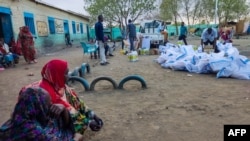United Nations agencies warn the humanitarian situation for an estimated 800,000 people in and around the Sudanese city of El Fasher is rapidly deteriorating as clashes escalate between the army and the paramilitary Rapid Support Forces.
Since fighting for control of El Fasher, the last stronghold of the Sudan Armed Forces in western Darfur, broke out March 10, the U.N. Office for the Coordination of Humanitarian Affairs (OCHA) reports an estimated 85 civilians have been killed and at least 700 wounded.
According to the International Organization for Migration, at least 1,250 people have been displaced since May, noting that "these reported figures are underestimates and are likely to increase."
"Due to the intensity of the fighting and lack of safe passage for civilians, it is anticipated that the number of reported casualties will rise," OCHA said Friday.
"As indiscriminate bombing encroaches on different neighborhoods of the city," it said, "the increased use of civilian infrastructure and objects for military purposes by parties to the conflict and the increased presence of armed elements throughout the town exacerbates protection risks faced by civilians."
A spokesperson for the U.N. refugee agency (UNHCR), William Spindler, said that thousands recently have fled into neighboring Chad.
"There have been many calls for the fighting to cease because of the impact it is having on the civilian population, and we continue to see people fleeing this region and crossing into Chad," Spindler said.
He said more than 600 people a day are crossing the border from Darfur, noting that in the last month nearly 19,000 new arrivals have been registered and "provided with emergency assistance, including food for four days and soap."
He said most refugee families are going to Adre, some 400 km. from El Fasher.
"The numbers continue to be relatively small," Spindler said, "but we have received reports there might be impediments for people who would like to seek refuge in Chad, but they are not able to do that because of the fighting or because they are being prevented by armed actors to travel."
“We also have received very worrying reports that some people who intended to either go to El Fasher from the surrounding countryside or cross into Chad have been killed,” he added.
Chad already hosts more than 600,000 Sudanese who have fled fighting in their homeland over the years. In addition to this huge refugee population, the United Nations estimates around 170,000 Chad nationals also have returned from Sudan since the rival generals went to war in mid-April 2023.
"Every week, an estimated 5,000 new arrivals continue to stream in, converging on 32 entry points in eastern Chad. With further, imminent attacks anticipated in Darfur, this number may further rise," said Blanche Anya, World Health Organization representative to Chad.
Speaking from the capital, N'Djamena, Anya said Friday the refugee crisis was having a profound impact on the health of the refugees and returnees, the overwhelming majority of whom are women and children, and on Chad's fragile healthcare system which "is under immense pressure."
"Many of the women and young girls have been raped. Malnutrition among children is widespread. Combined with measles and other epidemics, and overcrowding in under-resourced camps, we have an ongoing, serious health emergency.
"Every week, 1,500 to 2,000 cases of severe acute malnutrition are registered. As the prospect of famine in Sudan grows, we will see its repercussions in the health status of the new refugees arriving in Chad," she said.
Since the start of the crisis, WHO says 320 deaths have been reported among both the refugee and host populations. Of these, it says 184 deaths were malnourished children.
As the rainy season approaches, WHO warns the health situation will become more dire with access to affected populations becoming more difficult.
UNHCR's Spindler says the conditions of refugee camps in Chad, especially in Adre, are severely congested.
"And that is why UNHCR has identified a new site in Dougui, Ouaddai province where we would like to evacuate and transfer the refugees who are in Adre and very close to the border," he said.
"UNHCR, and its partners are racing against time to open the new site before the rainy season makes the roads impassable…Last Tuesday, the first rains fell in Adre. UNHCR aims to distribute lifesaving 'rain kits' before the imminent rainy season to the newly arrived and most vulnerable refugees.
"People must be moved as soon as possible to the camp where they will be safe, and where it will be easier to provide them with the aid they need," Spindler said.





